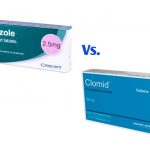Things to Avoid While Taking Clomid

For most people, taking a new medication may mean switching up your lifestyle a bit and that includes the foods you eat. A food-drug interaction means that a specific nutrient or compound within the food changes the way your body metabolizes the medication, and this can either enhance or reduce the dose your body gets, according to Johns Hopkins Medicine. The potential results: an increased risk of side effects, many of which can be dangerous, or the drug not working as it was intended.
Before introducing a medication, ask your pharmacist about any food interactions, including with alcohol, and any adjustments you may have to make to your diet. In this article, we will discuss Clomid and the things to avoid while taking it.
What is Clomid and how is it used?
Clomid is a brand of clomiphene citrate, a prescription medication used to treat the symptoms of infertility in women who have ovulatory failure. Clomid may be used alone or with other medications.
Clomid is often prescribed to women with polycystic ovary syndrome, or PCOS, which is a syndrome that can cause irregular or absent ovulation. However, not everyone will respond to this medication. Women with primary ovarian insufficiency, early menopause, and women with absent ovulation due to low body weight or hypothalamic amenorrhea are most likely to not ovulate when taking Clomid. Women with these conditions may need more intensive infertility treatment.
Clomid belongs to a class of drugs called Selective Estrogen Receptor Modulators. Clomid works by making the body think that your estrogen levels are lower than they are, which causes the pituitary gland to increase secretion of follicle-stimulating hormone, or FSH, and luteinizing hormone, or LH. Higher levels of FSH stimulate the ovary to produce an egg follicle, or multiple follicles, that will develop and be released during ovulation. High levels of LH stimulate ovulation.
Clomid is often prescribed by primary care physicians or OB-GYNs before they refer a couple to see a fertility specialist for more specialized care. Some reproductive specialists prescribe Clomid as well.
How should I take Clomid?
Clomid is a tablet taken by mouth. It is started on day 2 of the menstrual cycle (day 1 is the day you wake up bleeding) and initially a 50 mg tablet is taken once a day for 5 days. To help you remember to take Clomid, take it around the same time every day.
Ovulation usually occurs 5-12 days after the last Clomid tablet. If you forget a dose, take the missed dose as soon as you remember it. However, if it is almost time for the next dose, call your doctor for additional directions. Do not take a double dose to make up for a missed one.
If you do not have regular or have very infrequent periods, you will be given a progestin (such as Provera) to induce bleeding. Then begin the Clomid on the second day after your induced period has started.
In most cases, clomiphene should not be used for more than 3 treatment cycles. Using clomiphene for longer than 3 treatment cycles may increase your risk of developing an ovarian tumor. Ask your doctor about your specific risk.
If you do not get pregnant after 3 treatment cycles, your doctor may stop treatment and evaluate your infertility further.

Things to avoid while taking Clomid?
There are several things to do or avoid while taking Clomid, they include:
Alcohol: Avoid alcohol drinks while on Clomid, doing so increases the risk of acne, and overdose. Another reason why you should not drink alcohol while on Clomid is that alcohol worsens the side effects presented by the drug. It is important to remember that alcohol and Clomid both lead to similar side effects such as nausea, vomiting, and dizziness. Though these may not sound like serious conditions, the following are some more serious side effects of Clomid that could be worsened by alcohol:
• Vision problems such as seeing floaters, having blind spots, and blurry vision could degenerate into a total loss of vision.
• Hot flashes.
• Insomnia followed by impaired focus, attention, and generalized fatigue.
• Breast tenderness.
• Recurrent and persistent headaches. These are often preceded by scintillating scotoma.
• Ovarian inflammations coupled with persistent pain in the pelvic area.
• Nervousness.
• Bleeding in your uterus from causes other than the menstrual cycle.
• Pain and inflammation in your stomach and the entire abdominal area, especially near your ovaries.
• Multiple pregnancies (which as you know is not always good news).
• Ectopic pregnancy i.e. the development of the fetus outside the uterus, for instance in the fallopian tubes.
• Miscarriages.
• Increased chances of developing ovarian cancer.
• Increased chances of developing ovarian hyperstimulation syndrome (OHSS), a condition characterized by swelling and pain in the pelvis or abdomen.
• Increased chances of birth defects such as spina bifida, cardiovascular abnormalities, and cleft palate.
The presence of other medical problems may affect the use of this medicine. Make sure you tell your doctor if you have any other medical problems, especially:
- Unusually large ovary or
- Cyst on ovary—Clomid may cause the cyst to increase in size
- Endometriosis—Inducing ovulation (including using Clomid) may worsen endometriosis because the body estrogen level is increased; estrogen can cause the growth of endometriosis implants
- Fibroid tumors of the uterus—Clomid may cause fibroid tumors to increase in size
- Inflamed veins due to blood clots—Clomid may make the condition worse
- Liver disease (or history of)—Clomid may make any liver disease worse
- Mental depression—Existing depression may become worse because of hormone changes caused by Clomid
- Unusual vaginal bleeding—Some irregular vaginal bleeding is a sign that the lining of the uterus is growing too much or is a sign of cancer of the uterus lining; these problems must be ruled out before Clomid is used because Clomid can make these conditions worse





